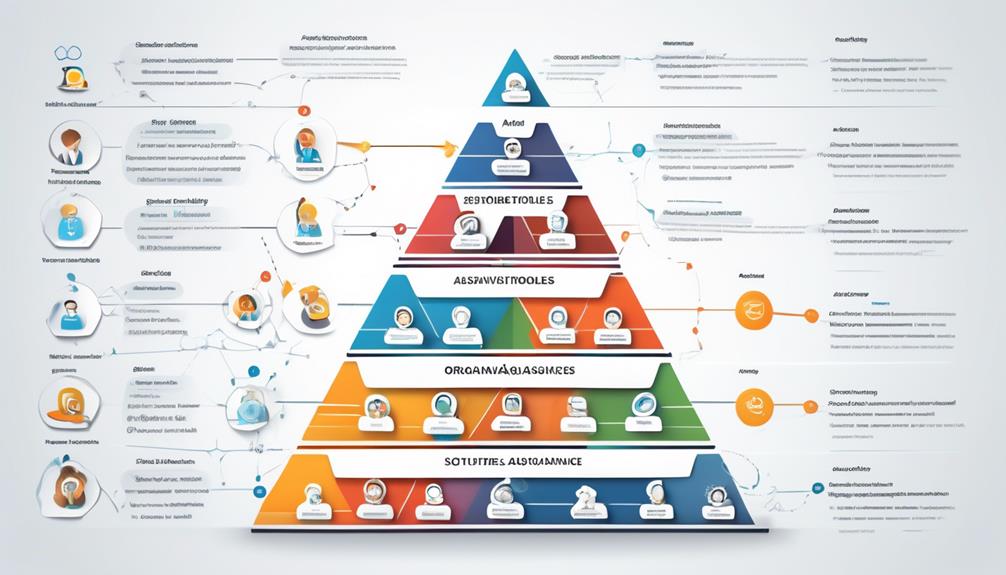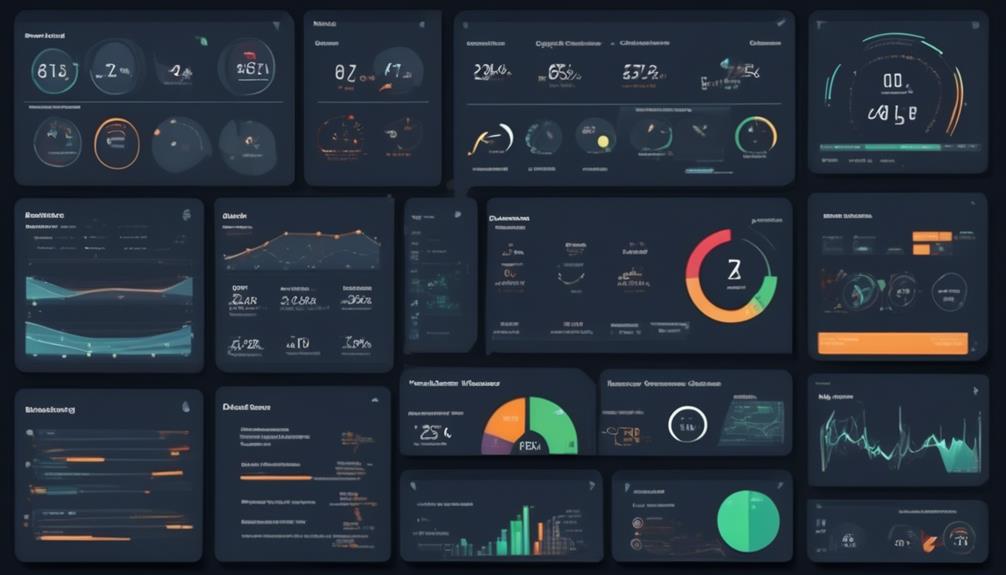Ensuring quality is a critical aspect of software development, and the ongoing challenge of finding skilled quality assurance testers persists.
As we navigate the ever-evolving landscape of technology, the significance of QA Tester Assessment becomes increasingly evident.
However, the question remains – how do we ensure that we are identifying the most adept candidates from a pool of applicants?
Join us as we explore the intricacies of QA Tester Assessment and uncover the key components that make this evaluation tool an indispensable asset in the quest for quality assurance excellence.
Key Takeaways
- QA tester assessments are important for evaluating candidates' skills and capabilities in designing effective tests.
- These assessments provide valuable insights into candidates' proficiency in testing methodologies and bug reporting techniques.
- Knowledge of different software testing approaches is crucial for QA testers in real-world scenarios.
- Thorough coverage and comprehensive test case creation are essential for identifying potential issues and enhancing QA skills.

FNP Certification Intensive Review, Fifth Edition, and Q&A Flashcards Set
As an affiliate, we earn on qualifying purchases.
As an affiliate, we earn on qualifying purchases.
Importance of QA Tester Assessment
We firmly believe that QA tester assessments play a vital role in evaluating candidates' proficiency in designing effective and efficient tests, ensuring thorough coverage of essential testing concepts and techniques. These assessments are of utmost importance in the field of Quality Assurance (QA) as they enable companies to gauge the capabilities of potential QA testers.
By assessing candidates' ability to design functional tests, adhere to testing procedures, and comprehend various testing methodologies, these assessments provide valuable insights into the candidates' skill set.
Moreover, an effective QA tester should be capable of employing diverse techniques to encompass all potential test cases, including challenging corner cases. The QA tester assessments allow companies to ascertain whether candidates possess this crucial ability, ensuring that they can address real-world problems in the realm of software testing and quality assurance.
Incorporating QA tester assessments from platforms such as TestDome into the hiring process can streamline the evaluation of candidates, enabling companies to identify and interview the best talent based on their performance in these assessments. This strategic approach to assessment not only saves time but also ensures that the most skilled individuals are considered for QA tester positions.

Generative AI for Software Testing: Improve QA with AI-Powered Automation
As an affiliate, we earn on qualifying purchases.
As an affiliate, we earn on qualifying purchases.
Key Areas for Assessment

When assessing QA testers, it's crucial to focus on their proficiency in testing methodologies and bug reporting techniques.
Understanding their ability to apply different testing techniques and accurately report bugs is essential for ensuring the quality and effectiveness of their work.
Assessing these key areas provides valuable insights into their capacity to design and execute comprehensive and efficient testing processes.
Testing Methodologies
In evaluating the understanding of testing methodologies, the Software Quality Assurance online test assesses the test takers' ability to design functional tests and follow testing procedures. This includes creating optimized test cases and using different techniques to cover all cases, including corner cases.
The assessment ensures that software works as expected and covers key concepts and techniques behind test development. A good QA tester or software developer should be able to demonstrate their ability to design effective and efficient tests.
This assessment tests the proficiency of individuals in applying various testing methodologies to ensure the quality and reliability of software products. It's crucial for test takers to showcase their knowledge of different software testing approaches and their ability to apply these methodologies effectively in real-world scenarios.
Bug Reporting Techniques
Transitioning from the assessment of testing methodologies, we now focus on Bug Reporting Techniques, emphasizing the critical areas for evaluating a QA tester's proficiency in identifying and documenting software defects.
Quality Assurance demands meticulous bug reporting techniques. It's essential to provide clear and detailed steps to reproduce the bug, including environment and software versions. A concise and descriptive title and summary for the bug report is crucial for effective communication.
Categorizing and prioritizing bugs based on severity and impact on functionality is vital for efficient bug resolution. Including relevant supporting materials such as screenshots, videos, or logs assists in bug reproduction and resolution.
Effective communication with developers through precise and constructive feedback and suggestions for improvement is imperative for successful bug resolution and software development.

Bug Bounty Bootcamp: The Guide to Finding and Reporting Web Vulnerabilities
Bug Bounty Bootcamp: The Guide to Finding and Reporting Web Vulnerabilities
As an affiliate, we earn on qualifying purchases.
As an affiliate, we earn on qualifying purchases.
Test Case Creation Evaluation
When evaluating test case creation, we focus on key points such as test case coverage, clear test steps, and boundary value testing.
Ensuring thorough coverage of test cases is crucial to identify potential issues and ensure the software functions as intended.
Additionally, clear and precise test steps and boundary value testing are essential for effective and efficient test case creation.
Test Case Coverage
Ensuring comprehensive test case coverage is essential for evaluating the effectiveness of our testing efforts and identifying potential gaps in addressing the various aspects of the software under test.
This involves assessing the extent to which test cases cover different functionalities, use cases, and scenarios. It also ensures that all requirements and specifications are adequately addressed through the test cases.
Furthermore, test case coverage evaluates the quality and thoroughness of test case creation, aligning it with testing objectives.
By focusing on minimizing gaps and ensuring comprehensive testing of the software, we can enhance our QA skills and contribute to the overall Quality Assurance process.
This approach is crucial for software engineers to deliver high-quality products and maintain customer satisfaction.
Clear Test Steps
To maintain the high level of test case coverage discussed in the previous subtopic, it's crucial to ensure that clear test steps are meticulously incorporated into the evaluation of test case creation. Quality assurance in test case creation necessitates detailed, sequential, and unambiguous test steps.
Each step should explicitly outline the expected outcome, specific conditions, and data requirements. The precision of these test steps is paramount, leaving no room for ambiguity or interpretation. By incorporating clear test steps, we can assess the accuracy and reliability of the testing process.
It's imperative that the test steps are easy to follow for any individual conducting the test case. Attention to detail in creating clear test steps is fundamental for a comprehensive and effective assessment of test cases.
Boundary Value Testing
Boundary Value Testing helps QA testers identify potential errors at the edges of input ranges, ensuring thorough evaluation of the system's behavior at critical boundaries. This technique is crucial for effective software assessment. Here's why it's important:
- Catching potential bugs: Testing at the edges of input domains helps in catching potential bugs that may not be identified through other testing methods.
- Test case creation: Test cases are created specifically to assess the behavior of the software at the boundaries of input values, ensuring comprehensive testing.
- Ensuring correct behavior: The goal is to ensure that the software handles boundary values correctly and doesn't exhibit unexpected behavior, enhancing the overall quality of the system.
- Improved test coverage: Boundary Value Testing improves test coverage, increasing the effectiveness of testing and providing a more robust assessment for the QA engineer.

Case Management Nurse Exam Secrets Study Guide: Case Management Nurse Test Review for the Case Management Nurse Exam
As an affiliate, we earn on qualifying purchases.
As an affiliate, we earn on qualifying purchases.
Bug Tracking Assessment
An effective Bug Tracking Assessment evaluates candidates' proficiency in identifying, reporting, and managing software defects with precision and strategic thinking. It's crucial for quality assurance professionals to possess strong bug tracking skills, as this directly impacts the overall software quality.
During the pre-employment test, candidates are evaluated on their ability to accurately identify and prioritize bugs, understanding the bug lifecycle, and effectively communicating with development teams. Proficiency in utilizing bug tracking tools and following bug resolution processes is also assessed.
Additionally, the assessment may cover concepts such as bug severity, reproducibility, and regression testing, requiring candidates to demonstrate a comprehensive understanding of these critical aspects of bug tracking.
The evaluation of these skills is vital in ensuring that the candidates have the necessary capabilities to contribute to the effective management of software defects within a quality assurance role. As such, the Bug Tracking Assessment plays a pivotal role in identifying candidates who possess the essential competencies for ensuring the overall quality of software products.
Communication Skills Evaluation

As we shift our focus to the Communication Skills Evaluation, it's imperative to recognize the integral connection between effective bug tracking and the ability to communicate clearly and professionally within a quality assurance role. The assessment helps evaluate the quality of a QA tester's communication skills, which are crucial for effective collaboration and problem-solving.
Here's a breakdown of the key aspects assessed:
- Verbal and Written Communication: Candidates are evaluated on their ability to convey information clearly and concisely through both verbal and written means, ensuring that their messages are appropriate for the intended audience.
- Complex Information Conveyance: The assessment seeks to identify candidates who can effectively communicate complex technical information in a clear and understandable manner, which is essential for documenting and explaining bugs and issues.
- Conflict Resolution and Constructive Discussions: Evaluators assess candidates' ability to resolve conflicts and participate in constructive discussions, reflecting their capacity to engage in productive problem-solving interactions within a team.
- Teamwork and Client Interaction: The evaluation includes scenarios related to teamwork, customer interaction, and presenting information in meetings or reports, aiming to identify individuals capable of professional and effective communication across various organizational levels and with external stakeholders.
Training Needs Identification

As we transition into the topic of Training Needs Identification, it's crucial to focus on the key points of skills assessment, performance evaluation, and training gaps identification.
By analyzing these factors, we can gain insights into the specific areas where training is required within our organization.
This strategic approach ensures that our training programs are tailored to address the precise needs of our employees and align with our overarching goals.
Skills Assessment
In identifying the skills and knowledge gaps within an organization, the process of Skills Assessment (Training Needs Identification) evaluates the existing skill sets of employees to determine the need for further training or development.
When conducting a skills assessment for QA tester roles in the quality assurance (QA) domain, it's crucial to consider the following:
- Analyzing performance, behavior, and competencies to understand the training needs.
- Bridging the gap between the current and desired skills and competencies required for effective job performance.
- Creating targeted training programs based on the assessment results to enhance employee skills and performance.
- Aligning the skills assessment with the recruitment process to ensure that new hires possess the necessary competencies for QA tester roles.
The skills assessment process plays a vital role in identifying and addressing the training needs of QA testers, ultimately contributing to improved quality assurance practices.
Performance Evaluation
Through thorough performance evaluation, we pinpoint individual skills and identify areas for improvement, ensuring that our team members are equipped with the necessary competencies for their roles. This evaluation process is essential for QA tester assessment as it allows us to assess a candidate's ability to ensure the quality of products. By evaluating a candidate's performance, we can identify specific areas where additional training or development is required to enhance their skills. The table below illustrates the key components of performance evaluation in QA tester assessment:
| Assessment Component | Purpose | Outcome |
|---|---|---|
| Skills and Competencies Audit | Identify existing skills and competencies | Determine areas for improvement |
| Performance Metrics Analysis | Measure individual performance against standards | Identify areas of strength and weakness |
| Training Needs Identification | Identify areas requiring additional training | Develop personalized training plans |
Training Gaps Identification
Upon evaluating current skills and knowledge against desired competencies and performance standards, we identify gaps in training to prioritize skill development and align with organizational goals. To achieve this, we:
- Conduct surveys, interviews, and observations to gather insights from employees, supervisors, and stakeholders about skill deficiencies and training needs.
- Analyze performance data, quality metrics, and error rates to pinpoint areas where additional training or skill development is required.
- Compare job requirements and expectations with the current skills and competencies of employees to identify discrepancies and training needs.
- Prioritize training needs based on the impact on performance, potential risks, and the organization's strategic goals.
In the context of QA tester assessment, this detailed analysis allows us to assess candidates thoroughly and tailor training programs to address specific skill gaps effectively.
Tips for Thorough Evaluation

When evaluating QA testers, it's essential to employ a variety of testing techniques to ensure thorough assessment of their skills. To effectively evaluate candidates, it's crucial to design functional tests that cover all possible cases, including corner cases, and to follow testing procedures meticulously to ensure the software works as expected.
Test takers should demonstrate the ability to design effective and efficient tests, showcasing their understanding of different types of testing and their capability to create optimized test cases.
Work-sample tasks are essential in the assessment process, as they help in evaluating candidates' skills in software testing and QA. These tasks should cover key concepts and techniques behind test development, ensuring that the candidates can apply their knowledge effectively in a team setting and communicate well with others.
A comprehensive software quality assurance online test should also assess project management capabilities, knowledge of test execution methods and tools, and the ability to resolve bugs.
Software Quality Assurance Online Test

To ensure a comprehensive evaluation of QA testers' skills, the Software Quality Assurance Online Test assesses their abilities in creating optimized test cases and understanding different testing techniques, offering a trusted assessment for many companies. The assessment evaluates a candidate's proficiency in designing functional tests and following testing procedures.
Here are four crucial aspects of the Software Quality Assurance Online Test:
- Work-Sample Tasks: Test takers are required to complete work-sample tasks that include creating optimized test cases and understanding different types of testing. This ensures that candidates can apply their skills in real-world scenarios.
- Test Case Coverage: The test evaluates the ability of candidates to cover various cases, including corner cases, and use different techniques to design effective and efficient tests. This demonstrates the candidate's capability to identify potential issues in software functionality.
- Understanding Testing Procedures: The assessment measures the candidate's understanding of testing procedures, ensuring that they can follow industry-standard practices to identify and resolve software defects.
- Functional Testing Proficiency: The test evaluates a candidate's ability to design functional tests and ensure that the software works as expected, demonstrating their competence in ensuring the quality and reliability of software products.
The Software Quality Assurance Online Test provides a comprehensive evaluation of QA testers' skills, making it a valuable tool for companies seeking highly competent professionals in software quality assurance.
QA Skills Test

The QA Skills Test assesses candidates' proficiency in designing functional tests and following testing procedures, ensuring their ability to deliver high-quality software products. It includes tasks related to understanding different types of testing and creating optimized test cases, including corner cases.
The test aims to evaluate the ability to design effective and efficient tests to ensure software works as expected. Additionally, communication skills are essential as QA testers often work closely with developers, product managers, and other team members to identify issues and ensure quality standards are met.
The engineer test assesses the understanding of the importance of Quality Assurance in the software development lifecycle and the ability to contribute to the overall quality of the product. It's crucial for candidates to demonstrate their attention to detail, analytical skills, and strategic thinking in approaching testing scenarios.
Mastering the QA skills test is vital for individuals seeking to excel in the field of Quality Assurance and deliver high-value contributions to software development processes.
QA Assessment Test (Advance)

In our endeavor to master the QA Assessment Test (Advance), we focus on honing our skills to deliver exceptional software testing contributions. To excel in this advanced assessment, we must:
- Practice skills rigorously to earn a certificate of achievement by scoring in the top 25%. This requires a deep understanding of different types of testing and the ability to create optimized test cases.
- Undertake work-sample tasks that evaluate our capability to employ various techniques to cover all cases, including corner cases. This ensures that we can guarantee the software works as expected.
- Demonstrate proficiency in covering key concepts and techniques behind test development. This involves showcasing our ability to use different testing techniques to ensure comprehensive test coverage.
- Showcase expertise in the key skills required for effective software testing. This includes demonstrating a deep understanding of testing concepts, methodologies, and the ability to apply them in real-world scenarios.
QA Tester Assessment – Evalground

Evaluating the proficiency of software testers through the QA Tester Assessment – Evalground involves analyzing their ability to design functional tests and follow testing procedures, providing insights into their working skills and job readiness. The assessment aims to evaluate candidates' skills in software testing and QA through comprehensive screening tests. The test includes work-sample tasks such as understanding different types of testing and creating optimized test cases. This enables recruiters to identify top talent who can effectively contribute to the software development process. By practicing and earning a certificate of achievement by scoring in the top 25% in the Software Quality Assurance Online Test, candidates can demonstrate their mastery in this field. Below is a table highlighting the key aspects of the QA Tester Assessment – Evalground.
| Assessment Feature | Description | Benefits |
|---|---|---|
| Designing Functional Tests and Testing Procedures | Evaluates ability to design effective tests and follow testing protocols. | Identifies candidates' proficiency in testing. |
| Work-Sample Tasks | Involves practical tasks to assess understanding of testing types and creation of optimized test cases. | Provides insights into candidates' practical skills. |
| Comprehensive Evaluation | Assess skills in software testing and QA through a thorough online test. | Helps recruiters identify top talent. |
Quality Assurance Aptitude Test

Skillfully designing functional tests and following testing procedures is a critical aspect of the Quality Assurance Aptitude Test, showcasing candidates' ability to ensure software quality and project management proficiency. When evaluating a candidate's ability in the Quality Assurance Aptitude Test, recruiters and hiring managers look for the following key aspects:
- Technique Variety: Test takers must demonstrate the use of different techniques to cover all cases, including corner cases, showcasing their ability to design effective and efficient tests.
- Work-Sample Tasks: The assessment includes work-sample tasks such as understanding different types of testing and creating optimized test cases, providing a practical demonstration of their skills.
- Coverage and Optimization: Candidates are evaluated on their capability to ensure that software works as expected by covering key concepts and techniques behind test development.
- Skill Evaluation: The QA aptitude test assesses candidates on key skills required for effective software testing and project management capabilities, providing a comprehensive evaluation of their abilities.
The Quality Assurance Aptitude Test serves as a crucial tool for evaluating a candidate's proficiency in software testing and project management, enabling recruiters and hiring managers to make informed decisions in the recruitment process.
Hire With Testgorilla

With TestGorilla, our focus shifts to an innovative platform that offers pre-made and custom tests for assessing various skills, including software quality assurance, ensuring a streamlined and effective assessment process. Employers and recruiters can leverage TestGorilla's intuitive interface to create tailored assessments that accurately evaluate a candidate's working skills and suitability for a job in QA testing.
The platform's subject matter experts ensure the relevance and industry standards of the tests, providing a reliable and insightful evaluation of candidates.
TestGorilla's screening tests play a crucial role in identifying top talent, predicting job performance, and promoting diversity in the workplace through unbiased candidate selection. Customer testimonials highlight the platform's ability to rapidly assess engineers, its ease of use, and its contribution to unbiased candidate selection, ultimately enhancing the overall user experience.
Frequently Asked Questions
How Do You Evaluate a QA Tester?
We evaluate a QA tester by analyzing their ability to:
- Design functional tests
- Follow testing procedures
- Understand different testing types
- Create optimized test cases
We also assess their capability to:
- Cover all cases, including corner cases
- Design effective and efficient tests to ensure software works as expected
Understanding key concepts and techniques behind test development is crucial. We pay close attention to these aspects to evaluate a QA tester thoroughly.
What Is Assessment in Qa?
Assessment in QA involves evaluating a candidate's ability to design and implement functional tests, follow testing procedures, and understand different types of testing. Test takers must demonstrate their ability to use different techniques to cover all cases, including corner cases.
The assessment aims to ensure that a QA tester or software developer can design effective and efficient tests to ensure software works as expected. It covers key concepts and techniques behind test development and evaluates the candidate's skills in software testing and QA.
How Do I Prepare for a QA Tester Interview?
To prepare for a QA tester interview, there are several things we can do.
First, it is important to research the company and its products. This will help us understand their quality assurance needs and how we can contribute to their testing process.
Next, we should discuss our experience with various testing types. This could include functional testing, regression testing, performance testing, and more. It is also important to highlight our ability to create optimized test cases that cover all necessary scenarios.
Another important aspect to showcase is our ability to design effective and efficient tests. This involves understanding the software development life cycle and how it impacts the testing process. By demonstrating our knowledge of this, we can show that we can create tests that align with the development process and catch any potential issues early on.
Lastly, it is important to discuss our knowledge of software testing methodologies and tools. This will showcase our expertise in the field and our ability to utilize the necessary tools to perform our job effectively.
How Hard Is QA Testing?
QA testing can be challenging due to the need for meticulous attention to detail and the ability to think critically and strategically. It requires a deep understanding of software development methodologies, test design techniques, and programming to solve software defects.
Additionally, effective communication and collaboration within a team setting are crucial. However, with the right skills and mindset, QA testing can be a rewarding and fulfilling career that offers opportunities for continuous learning and growth.
Conclusion
In conclusion, the QA Tester Assessment is the key to unlocking the potential of top-quality candidates in the field of software quality assurance and testing.
By evaluating their skills in test design, bug tracking, communication, and advanced QA techniques, companies can ensure that they're hiring the best fit for their teams.
Just like a well-crafted test case ensures a smooth and efficient software process, this assessment ensures a smooth and efficient hiring process for top talent in the industry.









